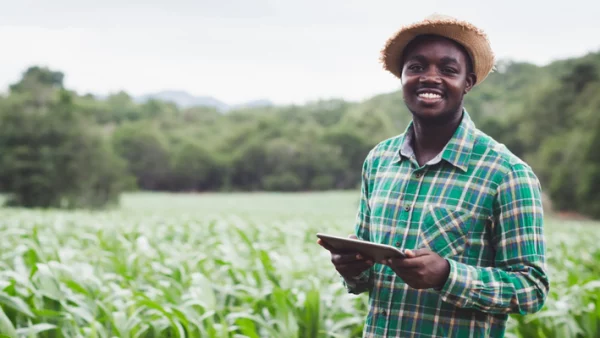Food security remains a critical challenge in Africa, where millions of people suffer from hunger and malnutrition. The continent’s population is projected to double by 2050, making it imperative to find sustainable solutions to ensure a steady food supply for its growing populace.
Read more about Business
Fortunately, Artificial Intelligence (AI) presents a transformative opportunity to address food security challenges in Africa. By harnessing AI’s potential, startups can revolutionize agriculture and food production, improve supply chain efficiencies, enhance crop management, and empower smallholder farmers. In this article, we will explore how startups can leverage AI to transform food security in Africa.
-
Precision Agriculture and Smart Farming
AI-powered precision agriculture and smart farming technologies are at the forefront of revolutionizing food production. Startups can deploy sensors, drones, and Internet of Things (IoT) devices to gather data on soil conditions, weather patterns, and crop health. Machine Learning algorithms can analyze this data to provide real-time insights, enabling farmers to make informed decisions about irrigation, fertilization, and pest control. By adopting precision agriculture, farmers can optimize resource usage, reduce waste, and maximize crop yields. This not only increases food production but also helps conserve water and minimize the environmental impact of agriculture.
-
Crop Disease and Pest Detection
Plant diseases and pests can devastate crops and lead to significant yield losses. AI-driven image recognition and computer vision systems can aid in the early detection and diagnosis of diseases and pests. Startups can develop smartphone applications that allow farmers to take pictures of their crops, which are then analyzed by AI algorithms to identify signs of diseases or pest infestations.
Timely detection enables farmers to take swift action, preventing the spread of diseases and minimizing crop losses. Access to such AI-powered tools can be particularly beneficial for smallholder farmers, who often lack access to traditional agricultural extension services.
-
Climate Prediction and Resilience
Climate change poses a significant threat to food security in Africa, leading to unpredictable weather patterns, droughts, and extreme events. Startups can leverage AI to analyze historical climate data and build predictive models to forecast weather patterns accurately. Climate prediction systems can help farmers plan their planting and harvesting schedules and adopt climate-resilient crop varieties.
Moreover, AI can support the development of climate-smart agricultural practices, such as rainwater harvesting, agroforestry, and soil conservation techniques. By promoting climate resilience, startups can help farmers adapt to changing environmental conditions and reduce the vulnerability of African agriculture to climate-related risks.
-
Supply Chain Optimization
Efficient supply chains are crucial for reducing food losses, ensuring food reaches consumers on time, and optimizing distribution networks. AI can play a pivotal role in supply chain optimization by analyzing data on transportation, storage, and demand patterns.
Startups can develop AI-powered logistics platforms that optimize routes, minimize spoilage, and reduce transport costs. Predictive analytics can anticipate fluctuations in demand, allowing for better inventory management and reducing food wastage. By streamlining supply chains, startups contribute to a more resilient and reliable food distribution system across Africa.
Sign up for the Connect Nigeria daily newsletter
-
Market Access and Price Transparency
Access to markets and price transparency are essential for farmers to secure fair prices for their produce. AI-driven platforms can connect farmers directly to buyers and provide real-time market prices, enabling informed decision-making.
Startups can develop mobile applications or web platforms that empower farmers to showcase their products, negotiate prices, and reach a broader customer base. By eliminating intermediaries, farmers can retain a more significant share of the profits and improve their economic livelihoods.
-
Financial Inclusion and Access to Credit
Many smallholder farmers in Africa face challenges in accessing credit and financial services. AI-powered credit scoring models can assess a farmer’s creditworthiness based on alternative data sources, such as mobile phone usage and transaction history.
Startups can collaborate with financial institutions to develop AI-driven lending platforms that extend credit to farmers based on their risk profiles. This improves financial inclusion and enables farmers to invest in inputs, machinery, and technologies that enhance productivity and food security.
-
Data Collection and Knowledge Sharing
AI can facilitate data collection, analysis, and knowledge sharing within the agricultural community. Startups can develop AI-powered platforms that aggregate and analyze agricultural data, providing insights to farmers, policymakers, and researchers.
By sharing best practices, agronomic information, and market trends, AI-powered platforms create a collaborative environment where stakeholders can learn from each other and make informed decisions.
Final Thought
AI has the potential to revolutionize food security in Africa by empowering farmers, optimizing agricultural practices, and enhancing supply chain efficiencies. Startups play a vital role in driving this transformation, as they are agile, innovative, and can tailor AI solutions to address the specific needs of African agriculture. By leveraging AI for precision agriculture, crop disease detection, climate resilience, supply chain optimization, market access, financial inclusion, and knowledge sharing, startups can pave the way for a more food-secure future in Africa.
Collaborative efforts between startups, governments, NGOs, and the private sector are essential to scale AI-driven solutions and ensure their widespread adoption across the continent. Together, we can harness the power of AI to create a sustainable and resilient food system that meets the growing demands of Africa’s population and contributes to global food security.
Featured Image Source: Forbes
Got a suggestion? Contact us: [email protected]


